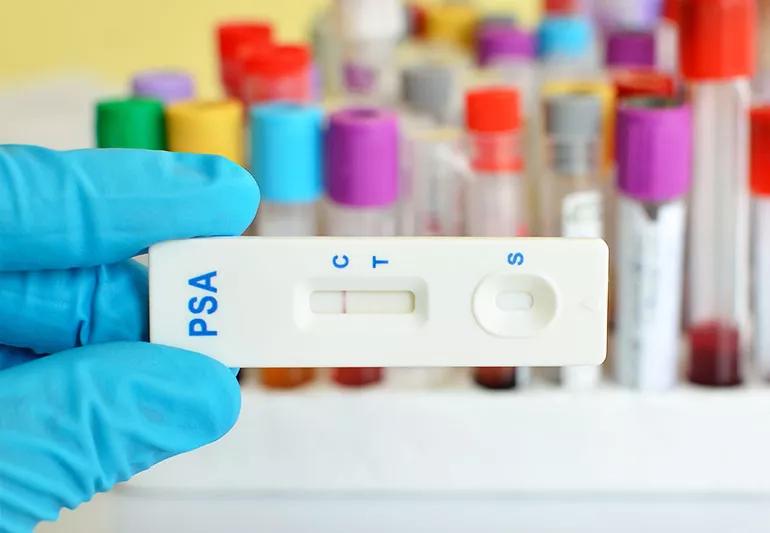This simple blood test can be key to early detection

Image content: This image is available to view online.
View image online (https://assets.clevelandclinic.org/transform/1b67eafe-0f7c-4e1e-9ea0-30a42a1210d7/PSATest-480437054-770x533-1_jpg)
Gloved hand holds a Prostate-Specific Antigen Test
A: Let’s answer that question with another question: If there were a simple test that could quickly determine your risk of having one of the world’s most common cancers, would you take it?
Advertisement
Cleveland Clinic is a non-profit academic medical center. Advertising on our site helps support our mission. We do not endorse non-Cleveland Clinic products or services. Policy
For most, the answer is surely “yes” — which explains why a PSA (prostate-specific antigen) test is viewed as a key tool for people with a prostate to manage their health after they reach a certain age.
But let’s start with some basic information. A PSA test is a blood test used to gauge the risk of prostate cancer. The prostate is a small gland that is part of the male reproductive system.
Is the PSA test without flaws? No. It’s possible to get test results showing elevated PSA levels without having prostate cancer. Higher levels could be a sign of an infection in the prostate or urinary tract, for instance.
But at the end of the day, a PSA test provides information that can lead to earlier detection and treatment of prostate cancer — particularly for those with higher risk levels. (More on that in a moment.)
The following statistics from the American Cancer Society help illustrate why testing is so important:
Advertisement
The American Urological Association recommends that people with a prostate between the ages of 55 and 69 look into getting a PSA test. It’s especially critical for higher risk groups, including those who are Black or have a family history of the disease.
Those with a higher risk of prostate cancer often choose to get an annual PSA test, sometimes starting before age 55. Those at lower risk often get a PSA test every other year. Some age 70 and older also choose to continue testing.
Talk to your doctor about what might be beneficial for you and how a PSA test can help you monitor for prostate cancer.
As mentioned, the test is simple — just a few minutes of your time and a needle poke. But it’s something you can do to get a better picture of your health and potentially learn about issues early enough for treatment and a good outcome.
With that in mind, here’s one more statistic: There are more than 3.1 million people alive today in the United States who have been diagnosed with prostate cancer at some point.
Early diagnosis from a PSA test improves one’s chances of joining that group.
— Urologist Samuel Haywood, MD
Video content: This video is available to watch online.
View video online (https://www.youtube.com/embed/WnF3ozjMM7I?feature=oembed)
10 Warning Signs of Prostate Cancer
Advertisement

Sign up for our Health Essentials emails for expert guidance on nutrition, fitness, sleep, skin care and more.
Learn more about our editorial process.
Advertisement
Family history and genetics may heighten your risk for prostate cancer
Anyone with a prostate can get prostate cancer, but some symptoms could be masked
Check-in with your care team, and focus on low-impact exercises and walking for good gains
Sex may be different after prostate cancer treatment, but it can still be enjoyable
If this common cancer is caught early, the prognosis is good
An enlarged prostate, diuretics and bladder irritants can all contribute
Not following recommended follow-ups could put you at risk
Not following recommended follow-ups could put you at risk
Type 2 diabetes isn’t inevitable with these dietary changes
Applying a hot or cold compress can help with pain
Pump up your iron intake with foods like tuna, tofu and turkey